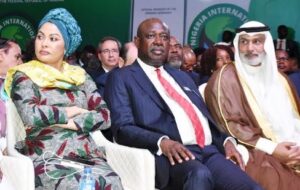Belgium Fears of Losing 40% Petrol Exports to Nigeria as Tinubu Pushes for Energy Investments
Belgium Fears of Losing 40% Petrol Exports to Nigeria as Tinubu Pushes for Energy Investments
Belgium has expressed worries about losing a significant share of its petroleum product exports to Nigeria as President Bola Tinubu intensifies efforts to attract energy investors and boost the nation’s refining capabilities. The concerns came after the President’s address in Abuja, where he highlighted the government’s dedication to growing the oil sector and its refining infrastructure.

This situation arises amid accusations from stakeholders at the 8th Nigeria International Energy Summit (NIES) in Abuja, who criticized developed nations for hindering investments in Nigeria’s oil and gas sector. They stressed that African countries need to prioritize domestic investments to avoid leaving oil and gas reserves untapped.
Represented by the Minister of State for Finance, Dr. Doris Uzoka-Anite, President Tinubu emphasized that tax reforms and streamlined regulatory processes have spurred investment in Nigeria’s oil industry, which has seen production reach approximately 1.8 million barrels per day (mbpd). Tinubu called for investment in various energy sectors, including oil exploration, power generation, and refining, underpinned by the Presidential Executive Order on Oil and Gas Sector Reforms, which has simplified licensing and encouraged local content development.
Belgium’s Ambassador to Nigeria, Pieter Leenknegt, acknowledged that Belgium supplies about 40% of Nigeria’s European refined oil imports but pointed out that this reliance would decrease as Nigeria’s refining capacity grows. Leenknegt also highlighted that while Africa’s industrialization is moving towards renewable energy, gas remains an essential transition fuel for the continent.
The summit also saw stakeholders voicing concerns that developed nations were obstructing vital investments in Nigeria’s energy sector under the pretext of climate policy. However, the ambassador mentioned Namibia’s green hydrogen project, co-financed by Belgium, Denmark, and Germany, as evidence of Europe’s commitment to Africa’s energy development.
At the summit, Mele Kyari, Group CEO of Nigerian National Petroleum Corporation (NNPCL), stressed Nigeria’s critical role as Africa’s largest oil and gas producer and its growing global energy influence. He affirmed that oil will remain a significant part of the global energy mix, contributing over 39% of global demand by 2025. Kyari highlighted Nigeria’s stable fiscal environment and emphasized the importance of developing gas infrastructure to help the country transition towards a trillion-dollar economy.
Dr. Omar Ibrahim, Secretary-General of the African Petroleum Producers’ Organisation (APPO), urged African nations to prioritize energy security and reduce reliance on external funding. He suggested that Africa should emulate the approach of developed nations that subsidize key industries, advocating for similar support for energy investments in Africa.
Benedict Oramah, President of the African Export–Import Bank (Afreximbank), reaffirmed the bank’s commitment to financing Nigeria’s energy projects, having already disbursed nearly $3 billion in support of the country’s energy sector. Oramah’s statement, delivered by Ayoola Mubarak, emphasized that the bank would continue structuring investment solutions that align with economic realities and regulatory frameworks to foster sustainable investments.
Haitham al-Ghais, Secretary-General of the Organisation of Petroleum Exporting Countries (OPEC), cautioned that Africa must secure its energy future or risk falling behind in the global energy transition. He highlighted OPEC’s role in providing stability over the past 65 years, ensuring energy remains affordable and accessible. Al-Ghais warned that the ongoing push to phase out fossil fuels, while necessary, must be gradual and inclusive to avoid hindering Africa’s progress.
Olu Verheijen, the President’s Special Adviser on Energy, shared that Nigeria had secured over $1.2 billion in gas sector investments within a year, driven by targeted reforms and data-backed energy development strategies. She pointed out that Nigeria’s focus on enhancing the commercial viability of its non-associated gas reserves—accounting for nearly 75% of its remaining reserves—is paying off. Verheijen also noted that over $700 million flowed into the gas sector in 2024, with an additional $600 million deal between Total and NNPCL, boosting portfolio values and returns by around 30%.
She concluded by emphasizing that Nigeria’s approach to energy investments ensures the country remains an attractive destination for both independent investors and multinational corporations.
TRENDING SONGS
 Nigerian Officials Allegedly Pocket N4–6B Weekly Through Smuggling Cartels at Seme–Badagry Border
Nigerian Officials Allegedly Pocket N4–6B Weekly Through Smuggling Cartels at Seme–Badagry Border
 Ahmad Yerima: Naval Officer to Face No Sanctions After Clash with Wike – Matawalle
Ahmad Yerima: Naval Officer to Face No Sanctions After Clash with Wike – Matawalle
 Trending Video: Muslim Man Joins Wife in Hallelujah Challenge ‘Dress Like Your Miracle’ Night
Trending Video: Muslim Man Joins Wife in Hallelujah Challenge ‘Dress Like Your Miracle’ Night
 Woman Seeks Advice as Late Brother’s Wife Refuses to Mourn Him Following His Death With Alleged Mistress
Woman Seeks Advice as Late Brother’s Wife Refuses to Mourn Him Following His Death With Alleged Mistress
 Nobody Cares About Fine Girls In The UK, I Miss Nigeria — Nigerian Lady Laments
Nobody Cares About Fine Girls In The UK, I Miss Nigeria — Nigerian Lady Laments
 Wedding Called Off: How Lady Cancels Wedding After Finding Out Finance’s Affairs With Her Bestie
Wedding Called Off: How Lady Cancels Wedding After Finding Out Finance’s Affairs With Her Bestie
 Heartbreak in Ikeja: Lady Weeps After Fufu Found in New Phone Package
Heartbreak in Ikeja: Lady Weeps After Fufu Found in New Phone Package
 Twist of Fate: Man Who Questioned Phyna’s ₦1Billion Demand Mourns Brother in Dangote Truck Crash
Twist of Fate: Man Who Questioned Phyna’s ₦1Billion Demand Mourns Brother in Dangote Truck Crash
 Tragedy in Enugu: Dangote Truck Claims Lives of Family of Five
Tragedy in Enugu: Dangote Truck Claims Lives of Family of Five
 Bangkok Crackdown: Nigerian-Thai Couple in Police Net Over Drug Trafficking
Bangkok Crackdown: Nigerian-Thai Couple in Police Net Over Drug Trafficking
Share this post with your friends on ![]()













